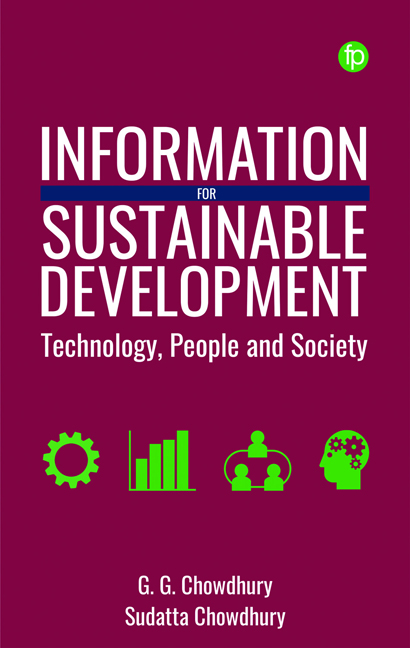Book contents
- Frontmatter
- Dedication
- Contents
- Figures
- Tables
- About the Authors
- Introduction
- 1 Data, Information, People and Society
- 2 Information and the Sustainable Development Goals
- 3 Sustainable Development Goals: Targets and Indicators
- 4 Data, Information and Progress in SDGs
- 5 Capacity, Co-operation and Sharing of Data for SDGs
- 6 People and the SDGs: the Digital Divide
- 7 People and the SDGs: Access to Data and Digital Skills
- 8 Information Skills and the SDGs in Everyday Life
- 9 Information, Education and Sustainable Development
- 10 Research and Development Around the SDGs
- 11 Information Education, Research and Professional Developments Around SDGs
- References
- Index
6 - People and the SDGs: the Digital Divide
Published online by Cambridge University Press: 13 April 2024
- Frontmatter
- Dedication
- Contents
- Figures
- Tables
- About the Authors
- Introduction
- 1 Data, Information, People and Society
- 2 Information and the Sustainable Development Goals
- 3 Sustainable Development Goals: Targets and Indicators
- 4 Data, Information and Progress in SDGs
- 5 Capacity, Co-operation and Sharing of Data for SDGs
- 6 People and the SDGs: the Digital Divide
- 7 People and the SDGs: Access to Data and Digital Skills
- 8 Information Skills and the SDGs in Everyday Life
- 9 Information, Education and Sustainable Development
- 10 Research and Development Around the SDGs
- 11 Information Education, Research and Professional Developments Around SDGs
- References
- Index
Summary
Introduction
People are at the centre of the SDGs, and while some SDGs are directly aimed at improving people's lives and living, such as eradication of poverty (SDG1) and hunger (SDG2), health (SDG3), education (SDG4), clean water and sanitation (SDG5), and work and economic growth (SDG8), others are meant for society as a whole, like gender equality (SDG5), reduced inequality (SDG10), and peace, justice and strong institutions (SDG16). As discussed in Chapter 3, the SDGs can be grouped in different ways, for example, in five categories, called the five Ps:
■ People: SDG1, SDG2, SDG3, SDG4 and SDG5
■ Planet: SDG6, SDG12, SDG13, SDG14, SDG15
■ Prosperity: SDG7, SDG8, SDG9, SDG10, SDG11
■ Peace: SDG16
■ Partnership: SDG17.
Or they can be grouped in the three categories, as the economic, social and environment SDGs:
1 Economic SDGs
(a) Life: SDG1, SDG2 and SDG3
(b) Economic and technological development: SDG8 and SDG9
2 Social SDGs
(a) Equity: SDG4, SDG5 and SDG10
(b) Social Development: SDG11, SDG16 and SDG17
3 Environmental SDGs
(a) Resources: SDG6, SDG7, SDG12 and SDG14
(b) Environment: SDG13 and SDG15.
Given that data is now considered as the ‘oil’ for the digital era (Economist, 2017), ICT (information and communication technology) and data form the foundation of progress in all the SDGs and their Targets. Access to the internet has significantly impacted society – people's lives and living. It is now considered as one of the key requirements for making progress in any area of life and living in the digital era. Therefore, it is the key Indicator to measure the growth of the information society.
The 2030 Agenda for Sustainable Development recognises that ‘the spread of information and communications technology and global interconnectedness has great potential to accelerate human progress, to bridge the digital divide and to develop knowledge societies’ (ITU, 2020, 1). Therefore, the SDG Indicator 17.8.1 specifically aims to measure how people in different countries access the internet, and can help to measure the digital divide.
Though ICT and data form the foundation of progress in all the SDG Targets, the level of access to, and use of, the internet for access to information is still a far-off goal for many people, and this creates a digital divide in society.
- Type
- Chapter
- Information
- Information for Sustainable DevelopmentTechnology, People and Society, pp. 101 - 116Publisher: FacetPrint publication year: 2024



